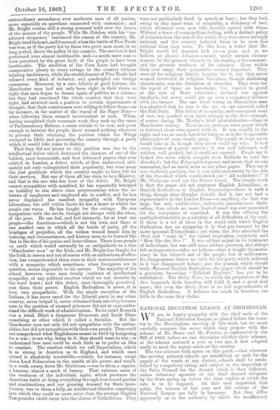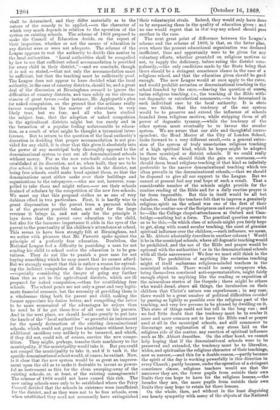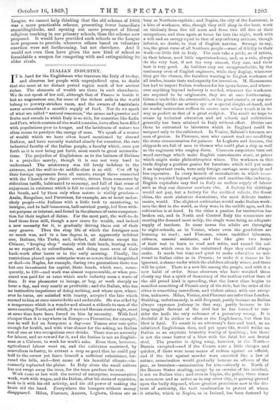NATIONAL EDUCATION LEAGUE AT BIRMINGHAM.
are in hearty sympathy with the chief ends of the National Education League, as placed before the coun- try in the Birmingham meeting of this week, but we must carefully compare the means which they propose with the scheme of Mr. Bruce and Mr. Forster, as represented in the Bill of 1868, before we can determine whether their scheme, or the scheme matured a year or two ago, is best adapted really to meet the urgent needs of the country. The two schemes both agree on this point,—that wherever the existing primary schools are insufficient or unfit for the supply of the wants of any district, schools shall be estab- lished by compulsory rating, and subject to the inspection of the Privy Council for the district which is thus deficient, unless voluntary agencies of the kind deemed adequate by the State spring up before the time expires at which the rate is to be imposed. On this very important first point, the scheme of last year and the scheme of the National League are fully in harmony. But they differ apparently as to the authority by which the insufficiency shall be determined, and they differ materially as to the nature of the remedy to be applied,—on the character of which very much depends in relation to the operation of the system on existing schools. The scheme of 1868 proposed to make the Council of Education decide, on the report of their inspectors, whether or not the means of education in any district were or were not adequate. The scheme of the League appears to vest the authority to decide this matter in the local authorities. "Local authorities shall be compelled by law to see that sufficient school accommodation is provided for every child in their district,"—and we conclude, though it is not so stated,—that not only the accommodation must be sufficient, but that the teaching must be sufficiently good. The League does not appear to have decided what the local authority, in the case of country districts, should be, and a great deal of the discussion at Birmingham seemed to ignore the difficulties of country districts, and turn solely on the circum- stances of great towns ;—for instance, Mr. Applegarth's plea for naked compulsion, on the ground that the artizans really favour compulsion in the matter of education, is very likely true, but we fear, and all who have studied the subject fear, that the adoption of naked compulsion in the agricultural districts might but too surely end in the formation of a popular feeling unfavourable to educa- tion, as a result of what might be thought a tyrannical inter- ference. But to return to the question of the local authority's discretion in deciding that proper accommodation is not pro- vided for any child, it is clear that this gives it absolutely into the power of any municipal body thoroughly opposed to the denominational system to root out all denominational schools without mercy. For as the new rate-built schools are to be established at its discretion, and as, when built, they are to be free schools, it is certain that no schools in the district, not being free schools, could make head against them, so that the denominations must either make over their buildings and organizations to the ratepayers,—who are not, however, com- pelled to take them and might refuse,—or see their schools drained of scholars by the competition of the new free schools. We must say that this proposal strikes us as one of very dubious effect in two particulars. First, it is hardly wise to grant dispensation to the parent from a payment which is of the greatest possible value, not only for the large revenue it brings in, and not only for the principle it lays down that the parent owes education to the child, but also for the immense importance it adds in the eyes of the parent to the punctuality of his children's attendance at school. This seems to have been strongly felt at Birmingham, and we notice with pleasure that Mr. Fawcett spoke against the principle of a perfectly free education. Doubtless, the National League feel a difficulty in punishing a man for not sending his child to school unless the education is to be gra- tuitous. They do not like to punish a poor man for not buying something which he may assert that he cannot afford. But we strongly suspect that this is rather a reason for extend- ing the indirect compulsion of the factory education system, —especially considering the danger of going. any further than this as yet in the agricultural districts, which are ill prepared for naked compulsion,—than for establishing free schools. The school pence are not only a great and very legiti- mate financial resource, but the necessity of providing them is a wholesome thing both for parent and child, making the former appreciate his duties better, and compelling the latter to be more economical of the advantages he enjoys than he need be if he got them free of all cost to his parents. And in the next place, we should hesitate greatly to put into the hands of the "local authorities " so powerful an instrument for the speedy destruction of the existing denominational schools, which could not grant free admittance without heavy additional sacrifices very unlikely to be incurred, and which, if they did not, could not, of course, survive the new compe- tition. They might, perhaps, transfer their machinery to the municipality, if The municipality would take it. But you could not compel the municipality to take it, and if it took it, the specific denominational school would, of course, be extinct. Now, is it clear that the new system would be so great an improve- ment upon the old as to make it desirable to invent so power- ful an instrument as this for the clean sweeping-away of the existing schools, or, at least, of the existing managements ? The scheme of 1868 would not have caused this risk. The new rating schools were only to be established where the Privy Council decided that the schools in existence were insufficient for the district, and as they were not to be free schools, even when established they need not necessarily have extinguished
Itheir voluntaryist rivals. Indeed, they would only have done so by surpassing them in the quality of education given ; and no one would regret that in that way any school should pass another in the race.
The next great point of difference between the League's scheme and the scheme of 1868, is that, on the latter plan, even where the present educational organization was declared inefficient, time and opportunity were to be given for any voluntary efforts, whether grounded on religious motives or not, to supply the deficiency, before rating the district corn- palsorily,—the only conditions made by the State being that there should be a stringent conscience clause in the case of a religious school, and that the education given should be good enough. The new League would at once apply to the rates, and would prohibit sectarian or denominational teaching in tke school founded by the rates,—leaving the question of unseti. tarian religious teaching, i.e., the teaching of the Bible with- out dogmatic or catechetical comments,—to be determined in each individual case by the local authority. It is obvi- ous, we think, that the tendency of the one system would be to preserve and extend the influence of schools founded from religious motives, while stripping them of all power of dogmatic tyranny,—while the tendency of the other system must eventually be to favour the secular system. We are aware that our able and thoughtful corres- spondent, the Head Master of the City of London School, looks forward to a very different result,—to a general exten- sion of the system of truly unsectarian religious teaching of a high spiritual kind, which he hopes might be adopted in these municipal or district schools. If we could really hope for this, we should think the gain so enormous,—we should deem broad religious teaching of that kind so infinitely preferable to the narrow denominational teaching which too often prevails in the denominational schools,—that we should be disposed to give all our support to the League. But we cannot at present feel any real hope of such a result. That a considerable number of the schools might provide for the routine reading of the Bible and for a daily routine prayer is far from impossible. Bat this in itself would be all but valueless. Unless the teachers felt that to impress a genuinely religious spirit on the school was one of the first of their duties, the routine use of the Scriptures and even of prayer would be—like the College chapel-attendances at Oxford and Cam- bridge—nothing but a form. The practical question seems to us to be this,—In which class of schools might you fairly hope to get, along with sound secular teaching, the most of genuine spiritual influence over the children,—such influence, we mean, as Mr. Abbott admirably describes in another column ? Would it be in the municipal schools, where all dogmatic teaching would be prohibited, and the use of the Bible and prayer would be optional with the authorities ? or in the denominational schools with all their narrowness ? We fear we must still think in the latter. The prohibition of anything like sectarian teaching might of itself embarrass religious-minded teachers in the municipal schools. There would be many ratepayers who, being themselves convinced anti-supernaturalists, might fairly enough object to anything like the reading or exposition of the miraculous stories of the Gospels ; there might be others who would dread, above all. things, the inculcation on their children that Christ's nature was superhuman ; in any case, there would be a great number of political difficulties avoided by passing as lightly as possible over the religious part of the teaching, and very few persons to be pleased by dwelling on it. This state of things could not but tell in the long run ; and we feel little doubt that the tendency must be to render it more and more common not to have the Bible read or prayer used at all in the municipal schools, and still commoner to discourage any explanation of it, any stress laid on the religious side of the matter, any exertion of spiritual influence such as Mr. Abbott describes. On the other hand, we cannot help hoping that if the denominational schools were to be preserved and extended, the tendency must be to liberalize, widen, and spiritualize the religious character of their teachings, now so narrow,—and this for a double reason,—partly because the spirit of the day is working powerfully in this direction in every Church; partly because, under the operation of a stringent conscience clause, religious teachers would see that the narrower they are, the fewer pupils from outside their own limits they can hope to have for the religious lessons,—the broader they are, the more pupils from outside their own limits they may hope to retain for those lessons.
On the whole, then, and without in the least disguising our hearty sympathy with many of the objects of the National
League, we cannot help thinking that the old scheme of 1868 was a more practicable scheme, presenting fewer immediate stumblingblocks, and opening out more prospect of liberal religious teaching in our primary schools, than the scheme now proposed. It would have provided such schools as the League now proposes to provide, wherever others based on voluntary exertion were not forthcoming, but not elsewhere. And it would not even then have given the new kind of school so formidable a weapon for competing with and extinguishing its elder rivals.
































 Previous page
Previous page